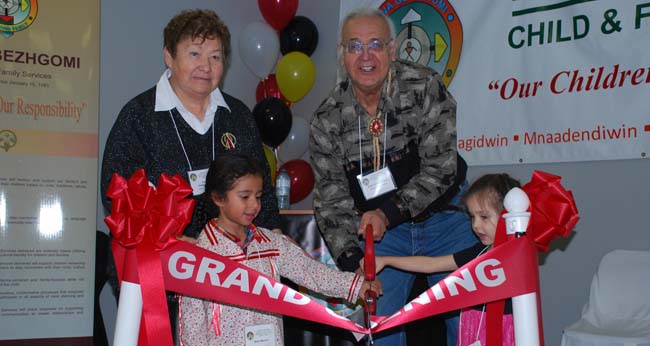Kina Gbezhgomi opens urban office, work continues on becoming a child welfare agency

By Laura E. Young
SUDBURY- In every marathon there are key moments en route to the finish line.
Kina Gbezhgomi Child and Family Services celebrated such a milestone with the official opening of its urban office in the City of Greater Sudbury on Friday, January 23.
And then there’s the eye on the final prize.
For more than 20 years, Kina Gbezhgomi has been working towards assuming full and complete responsibility of child welfare services for indigenous children and families. The vision has always been to ensure that their children are protected “and stay connected with their culture, language and community while strengthening family and community relationships.”
Kina Gbezhgomi represents Whitefish River, Aundeck Omni Kaning, Sheguiandah, M’Chigeeng, Sheshegwaning, Zhiibaahaasing First Nation with Wikwemikong Unceded Indian Reserve-Kina Gbezhgomi Child and Family Services. www.kgcfs.org
The urban office is a stepping stone in the work to serve the growing urban indigenous population. Statistics Canada shows that at least 60 per cent of First Nations people live off reserve in Canada’s mosaic of multicultural cities.
“I feel really good because so many years ago it was a dream. What we wanted to do was daunting given there was tremendous resistance from the government,” said Chief Joseph Hare of M’Chigeeng First Nation.
In 1984, Chief Hare, along with the late Chief John Ronald Wakegijig of Wikwemikong Unceded First Nation on Manitoulin Island, helped lead the work towards developing a Native Child Welfare Agency with the “Our Children Our Responsibility” proposal.
In 1991 Kina Gbezhgomi was incorporated and has been driving forward ever since.
Over the years, they dealt with all political parties through changes in government, Chief Hare reflected.
“It was always hard to restart the argument. It felt almost unreachable, the goal that we had set for ourselves. It gives you a good feeling to know that when you persist, and you have this idea in your mind that if others can do it, so can we.”
Now the challenge for their communities includes working with the young people and those afflicted with problems of addiction and mental health issues, he added.
“We’ve started on that journey which is really heartening. From there we move on to the parents, as well and adopt the sense that it’s serious that we have children that are our responsibility, both as parents, and as extended family and as communities as a whole.”
“I never thought I’d see this day,” said Glen Hare, Union of Ontario Indians Deputy Grand Council Chief.
Reflecting on his family and the community at large, he felt there is no need for non-native workers to take their children. “We have enough professionals in our communities to look after our children. They’re ready to go.”
Opening an urban office was an important day; when Kina Gbezhgomi receives full designation as a child and family services agency, “then the celebration will begin in our communities,” said Ogimaa Duke Peltier of Wikwemikong, which hosts Kina Gbezhgomi’s main offices.
“There’s no need for children to be taken from our homes. The sooner we can get to that point, the sooner our communities will start to flourish again.”
“The ultimate goal is prevention type services as opposed to protection. The discussions that are occurring currently with the Ministry (of Child and Youth Services) and the Anishinabek Nation fall in line with our belief that we have the inherent right and jurisdiction over the care of our children. As opposed to being legislated under an act of the provincial government for the care of our children.”
The opening of the urban office means increased services to its community members as well as strengthening ties with service providers already working within the Sudbury community.
It’s expected that full designation will come this year, according to Denise Morrow, Kina Gbezhgomi’s executive director.
Kina Gbezhgomi’s urban office is currently located at 866 Newgate Avenue, Unit 1, just off Notre Dame Avenue in Sudbury’s central core. www.kgcfs.org


